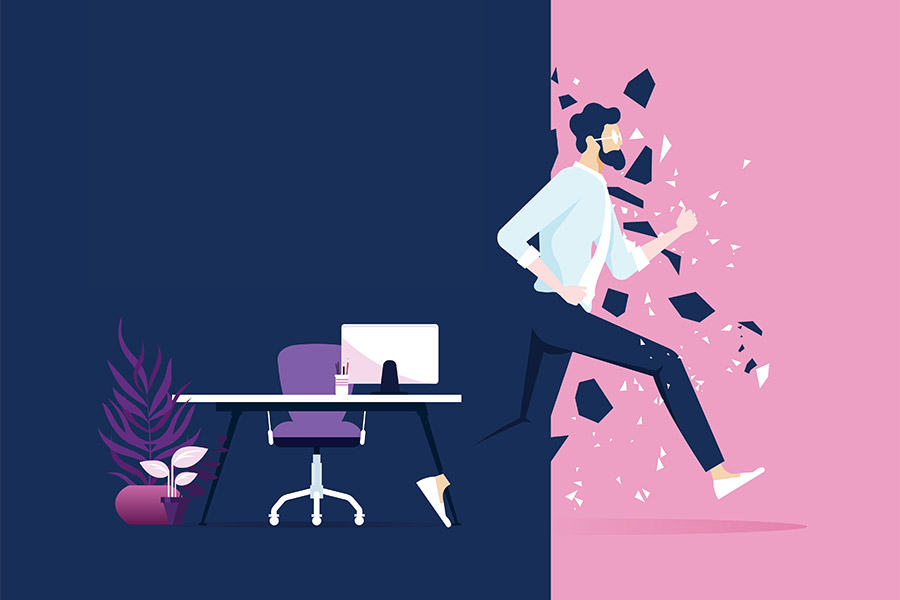A survey by Cigna showed that 92 percent of Singaporeans are stressed at work, which is higher than the global average of 82 percent. Of this, 13 percent considered their stress unmanageable, causing lack of sleep. Some other common presenting symptoms affecting working adults include: impaired judgment, loss of control, trapped in a vortex of endless work, immense fatigue, isolation from familiar connections, and physical health issues. Like a silent tumor, work gradually engulfs the life it supposedly supports.
Work, provides a multitude of tangible and intangible benefits, as avenues of creativity, purpose and passion that support our wellbeing. It gives us increased purchasing freedom, skills mastery, recognition, promotion, sense of fulfilment, prestige, and even power. The incentives to work are manifold, but at the same time, the significance we attribute to it could bring undesirable effects to our overall wellbeing.
With the long-drawn out pandemic, work stress is accelerated by apprehension of the virtual environment. While remote and/or hybrid work settings have advantages and proven productivity, the flipside is, human interactions and connections are compromised. People feel more unsafe in their isolated work environment. The unknown and unfamiliar, loss of control, blurred boundaries between work and personal life can contribute to the insidious build-up of anxiety that one is oblivious to.
The lack of self-awareness blinds us to our own fears, anxieties and insecurities that lurk within the caverns of our inner beings. The grip of compulsion to perform and produce feels like a cranked-up machine going at full speed. Gradually, it morphs into a cyclical pursuit of working harder, and longer hours to impress upon the bosses that we are responsibly fulfilling our tasks. Over time, the unbearable strain unravels our human limitations manifested in relentless mental torment, painful emotional states like, depression, anxiety, guilt, anger, and even physical illnesses. We may then confront a rude awakening when the soul is spent, the spirit barren…withdrawal from life is a desperate attempt to conserve and survive the burn.
If these predicaments seem familiar, it is worth taking the following actions as suggested by a psychologist:
- Re-examine to gain self-awareness by taking an honest look at how work has impacted you physically, psycho-emotionally, spiritually and interpersonally. This also means recognizing fit issue or taking on too many roles and responsibilities at the expense of optimal performance.
- Realign your values, priorities, and choices to identify what matters most to you.
- Rediscover the need to slow down, and even take a sabbatical for reflection and renewal. Without which, our innate protective defenses will eventually break down.
- Reconnect by having quality time with self, family and friends so that we can replenish our energy and resources.
It may warrant speaking to a counselor or psychotherapist when the abovementioned symptoms build up with no reprieve in sight.
Thriving at work involves taking personal responsibility in caring for one’s wellbeing, but without supportive employers it might still be an uphill battle. Employers are to create a supportive and safe work culture where every employee is valued regardless of their roles and responsibilities. There is to be a focus on enhancing the wellness of the whole person through fair and impartial treatment, addressing of grievances, clear disciplinary processes, creation of a respectful and non-intrusive interpersonal milieu.
Work is good, necessary and gratifying, but it is a double-edged sword that can cost us dearly in terms of our physical and mental wellbeing. Having the right perspective in situating oneself in the milieu of work without losing the self is crucial, not only surviving, but thriving in the long haul.
你可能也喜欢
Engaging the Millennials in Your Workforce
With the evolving workforce, millennials form a large part of our workforce today. It is critical therefore that organizations consider how they can better engage their millennial workforce to achieve greater efficiency and synergy.
Reinvent You in the New Norm
COVID-19 has in many ways shaped the future of work into the new normal for both workers and organizations. Changes are rapid, and we will need to reinvent ourselves for this new norm, and there is no better time than now to begin.
The Future of Work – Agility and Adaptability
With the emergence of new industries, a workforce that is agile and adaptable will be in high demand. We can anticipate that the future work environment will be radically different. The deeper question then is, “What will the future of work look like? How can the workforce chart a career path that they know nothing about?”




